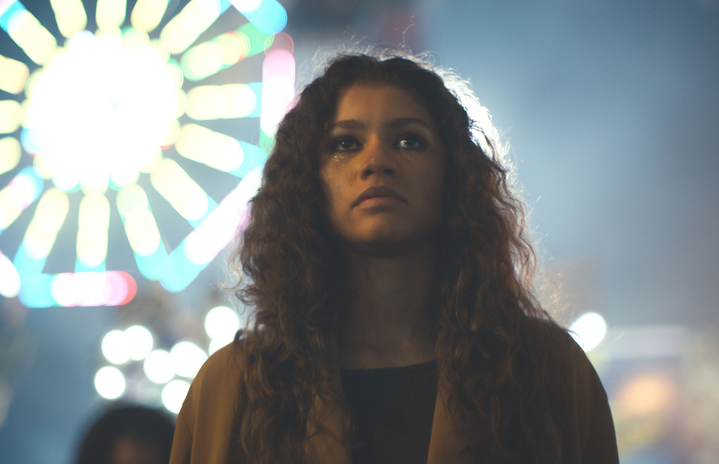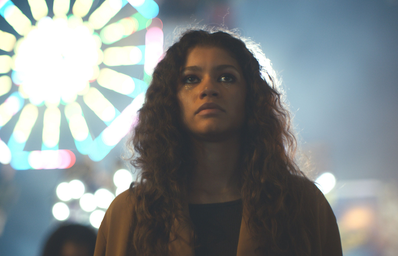CONTENT WARNING: THIS ARTICLE CONTAINS SPOILERS OF EUPHORIA AND FREQUENT MENTIONS OF TEENAGE DRINKING/DRUG USE AND SEXUALITY
DISCLAIMER: I AM IN NO WAY AIMING TO ANGER/OFFEND ANY READERS, THIS ARE JUST MY THOUGHTS AND INTERPRETATIONS.
Three years ago, HBO came out with a cable show called Euphoria, starring American actress Zendaya, among other talented names. The show is centered around several high school students navigating the ups and downs of high school, specifically mature topics such as drug use and sexuality.
The show’s main character and narrator, Rue Bennett (Zendaya) is a 17 year old junior in high school struggling with addiction. We first meet her when she is returning from rehab, after overdosing before season 1 began.
When season 1 came out, I did not watch it immediately. I was not familiar with mature content, nor did I have much of an interest in consuming it.
When the show premiered, it was a hit. Rotten Tomatoes gave it an 87% approval rating, while the audience rating was 85%. Euphoria offered a harshly realistic and raw inside look on how some cultures and individuals may be in high school. With graphic scenes of nudity, sexuality, and frequent drug and alcohol use, the show provided viewers with a shocking, and arguably non-romanticized view of the American high school experience.
After I learned the ins and outs of the show’s plot, the characters and the mature content, I watched it. Only one episode at a time each day, I consumed the show in pieces, trying to let myself dissect and analyze the show’s cinematography and character development and decide if it was worth more of my time.
Controversies within Euphoria
One of Euphoria’s significant characteristics is the frequent and graphic nudity in it. I think part of the reason that the show was so admired and talked about, was because it had a new take on nudity in cinema. In the past, movies and TV shows regularly showed female nudity. Even in sexual scenes, usually viewers would only see femaile nudity. Euphoria employs the use of female nudity, but it also offers just as much male nudity. At least for me, I know that I am certainly not as used to male nudity as I am to female, and I think this is a major part of the show’s shock factor.
The show also shows very graphic scenes of alcohol and drug use. There is a lot of controversy regarding this aspect of the show; some argue that it conveys an accurate and harsh reality, while others think that it is a crude romanticization of a very real and raw topic.
Personally, I have never seen alcohol or drug abuse up close. Thankfully, I have never had to witness the dire consequences of each of these diseases. I say this because I, by all means, do not deem myself qualified to say it is one way or another. From what I have learned about drug and alcohol abuse, I think that the portrayal of it in the show is very jarring and disturbing — which is what the subjects are in reality. Like I said earlier, I could not bring myself to watch the show when it first came out because I was not sure if I would be able to handle it.
Lately, I started to view the show in a different way. Something about the production of Euphoria awakens the film major in me. One of my favorite parts of the show being released only once a week, is that immediately after, on almost every social media platform, people are talking about it and predicting and relaying their theories for the internet to ponder, which is exactly what I think HBO wanted viewers to do.
Of course, there are critiques. Euphoria’s director, Sam Levinson, has received a decent amount of backlash regarding certain scenes and character development.
One of the show’s main characters, Cassie Howard, portrayed by American actress Sydney Sweeney is meant to be viewed as a teenage girl with deep-rooted insecurities and trauma regarding her father. The goal is to portray her as promiscuous and licentious. The stigma that surrounds the ‘girl with daddy issues’ is, subjectively, perfectly executed in her character. Costume and makeup designers of Euphoria have stated that her outfits and presentation is aimed to be very ‘off the rack’ and generic.
Sweeney has been the main character and subject in the majority of the nude, sexual scenes in the show. Sweeney and Levinson have had multiple conversations regarding Sweeney’s Cassie’s nudity in the show, and the necessity for nudity in certain scenes has been discussed between the two. Sweeney says, however, that she has never received any push back regarding Cassie’s nudity.
Another issue that I have with Cassie’s character development in the show is the lack of depth. Levinson’s ability to accurately portray distress and emotion within Cassie’s character is obviously skewed. Men have notoriously ill-represented women’s emotions within TV and media for centuries. I was expecting a bit more from Levinson in this area, so far he has not shown any emotional development for Cassie. Levinson’s best approach to illustrate Cassie’s distress is to have her cry on set and frequently use alcohol to cope. However, there is an argument that Cassie’s character is meant to be this shallow. After all, she is directed to be the stereotypical teenage girl with daddy issues. But maybe that’s giving him too much credit. Both sides of the argument have compelling points.
In my opinion, I think that Sam Levinson has put himself onto something of a high horse. It is no shock that men cannot write women as well as women can write women, but I would’ve preferred to see a deeper character arc or development, rather than Cassie’s big plot moment being her complicated relationships. Sam Levinson was given a very large amount of power; he was able to freelance and write a script that incorporated a lot of mature themes like sex and drugs and vulgarities. However, I think that he has taken this power for granted and taken the script writing a bit too far. Viewers have expressed concern about the (alleged) script leaks online, which feature a lot more extreme vulgarities and excessive use of very mature language.
There are bound to be controversies surrounding shows that are as advanced and mature as Euphoria is. It’s not a shock that writers and actors have received backlash for the screenplay and the acting, but I suppose that HBO may have wanted to spark this conversation of controversy. Many of the aspects of this show have been overlooked or ill-represented in today’s media, and I think Euphoria aimed to bring a new perspective on the trials of today’s social media culture.
What Makes Euphoria Beautiful
Despite all of it’s critiques, there are many aspects of this show that also make it beautiful and cinematic.
As said in Enter Euphoria, an after episode special that follows each episode as it is released weekly, in episode 1, the entirety of season 2 was filmed on a specially made film camera. Producers and directors wanted to create the appearance of maturity and aging within the show. Season 1’s visuals were heavy on the glitter and sequins and bright colors, as they aimed to capture the youthful glow of Euphoria. Viewers expressed concern in the way that the show was using these aesthetically pleasing visuals to romanticize the happenings in the show, however I think that the writers and producers managed to balance the, for lack of better word, euphoric feeling of drug use and the numerous consequences that immediately follow.
Season 2 has been more focused on the maturing of the characters within the show, and the visuals have expressed this. Throughout season 2 episode 1, there is frequent use of flash film,
where the camera focuses on one specific character by shining a bright, orange-ish light on the subject of the frame, and darkening the surroundings around it. The show has become known for its cinematography and visually pleasing effects, and for good reason.
Another appealing aspect of the show is the expertly curated and original soundtrack. Despite use of already released songs in season 1, Euphoria hired British singer-songwriter Timothy Lee McKezie, formerly known by his stage name, Labrinth.
Labrinth curated and wrote a very beautiful soundtrack for season 1, (Euphoria (Original Score from the HBO Series)) with songs like “Forever” and “Still Don’t Know My Name.” Viewers seemed to really enjoy the curated soundtrack. Personally, I think that writers and directors could not have chosen a better artist to create the soundtrack for a shoe like Euphoria. Labrinth’s haunting vocals and melodies seem to capture the emotion within the show, and the two fit together perfectly.
Season 2 then went on to feature Labrinth in episode 2, titled “You Who Cannot See, Think of Those Who Can,” as a singer leading a praise song in church. Viewers immediately began dissecting this surprise cameo, myself included, constructing theories such as he was meant to be playing a god of sorts to Rue, who is rumored to have overdosed at the end of the episode.
I think that the use of Labrinth’s cameo in season 2 was very interesting. The show broke the fourth wall by incorporating the soundtrack’s singer into the show. I, personally, love when shows break fourth walls and start to incorporate audiences or outside forces into the show, and I think that the way Euphoria did it was perfect.
So many parts of HBO’s Euphoria have been deemed ‘unacceptable’ or ‘romanticized’ or’ badly represented.’
But parts of it have been deemed as ‘visually perfect’ or ‘cinematic’ or ‘expertly represented.’
Part of the charm of Euphoria is how subjective it is. This show has sparked conversations in a way that I have never seen before. The controversy of the show goes hand in hand with the admiration. HBO has managed to create a show so layered and relative that viewers my age (and other ages) cannot seem to get enough of it.
I, similar to many people in my age range, cannot wait to see what the actors and writers and producers will do next in the production and release of Euphoria.


